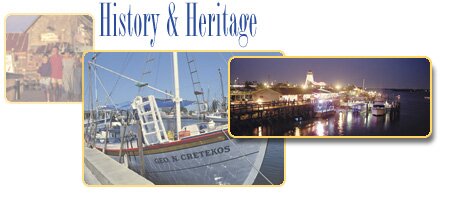 |
 |
 |
Discover Our Rich History and Culture.
From early Native American settlements, to arrival of Spanish conquistadors in the 1500s, to pioneering citrus farmers, railroad barons and entrepreneurial land developers, Florida's Gulf coast has always attracted people in search of opportunity and adventure. Not only did they help build this thriving region, they left a rich and fascinating legacy.
|


|
Native Americans
Thousands of years before the Spanish came, Native Americans flourished in the area. Burial mounds from the Pre-Columbian Native Americans are preserved throughout the county and can be seen at Philippe Park and Weedon Island Preserve.
|
 |
 |
Spanish
Hernando de Soto explored the area in 1539. In his search for wealth, de Soto reportedly discovered five mineral springs near a large Tocobaga Indian village in what is now Safety Harbor. He named the springs "Espiritu Santo" or "Springs of Sacred Spirit".
|
 |
 |
French
Old stories say that a group of pirates advised Dr. Odet Philippe, who claimed to be the nephew of King Louis XVI, to visit the area in the 1830s. Philippe established a plantation near Safety Harbor, and with citrus stock brought from the Bahamas, he cultivated Florida's citurs crops.
|
 |
 |
Scottish
If the sound of bagpipes fills the air along with the perfume of orange blossoms, you can only be in one place: Dunedin. One of the oldest cities on Florida's West Coast, this community traces its roots and its name back to its founding fathers who were merchants from Edinburgh.
|
 |
 |
Russian
Peter Demens, a Russian immigrant, brought his small gauge, Orange Belt Railroad to the Gulf Coast of Florida whose new rail service produced a flood of new residents and visitors to the area. Demons named the city St. Petersburg after his hometown in Russia.
|
 |
 |
Greek
Around 1900, a local entrepreneur encouraged Greek sponge divers to come to this area and harvest the rich sponge beds off the coast. And by 1905, the Greek population had grown to more than 500, with 200 sponge boats in operation. To this day, sponge harvesting is a key part of this fishing community's economy.
|
 |
 |
|
|
|
|







